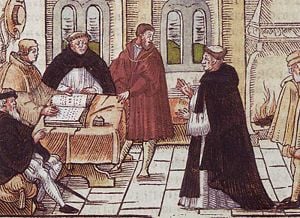Cardinal Cajetan
- For the saint, see Saint Cajetan.

Thomas Cardinal Cajetan (Ca'jê-tan or Caj'e-tan, also known as Gaetanus), real name Tommaso de Vio (February 20, 1469 - August 9, 1534) was an Italian cardinal best known for his opposition to the teachings of Martin Luther and the Protestant Reformation. He is not to be confused with his contemporary, Saint Cajetan, the founder of the Theatines.
Life
De Vio was born in Gaeta in the kingdom of Naples, Italy on February 20, 1469 as Jacopo Vio. The name Tommaso was taken as a monastic name, while the surname Cajetan derives from its native city. At the age of fifteen he entered the Dominican order, and, devoting himself to studies in philosophy of St. Thomas Aquinas (he is the founder of Neothomism), became, before the age of thirty, a doctor of theology at Padua, where he was subsequently professor of metaphysics.
A public disputation at Ferrara (1494) with Pico della Mirandola gave him a great reputation as a theologian. He was made general procurator in 1507 and general of his order a year later in 1508. For his zeal in defending the papal rights against the council of Pisa, in a series of works which were condemned by the Sorbonne and publicly burnt by order of King Louis XII, he obtained the bishopric of Gaeta, and in 1517 Pope Leo X made him a cardinal and archbishop of Palermo.
Faithful to the traditions of the Dominicans, he appears in 1511 as a supporter of the pope against the claims of the Council of Pisa, composing in defense of his position the Tractatus de Comparatione auctoritatis Papeœ et conciliorum ad invicem. At the Fifth Lateran Council (1512-17) which Pope Julius II set up in opposition to that of Pisa, De Vio played the leading role. During the second session of the council, he brought about a decree recognizing the infallibility of the pope and the superiority of papal authority to that of councils.
For his services Leo X made him in 1517 cardinal presbyter of Saint Sisto in Rome, and made him in the following year bishop of Palermo. He resigned as bishop of Palermo in 1519 to become bishop of Gaeta, as granted him by the Emperor Charles V, for whose election De Vio had labored zealously.

In 1518 he was sent as legate to the Diet of Augsburg and to him, at the wish of the Saxon elector, was entrusted the task of examining and testing the teachings of Luther. Treatises of his own, written, without knowledge of Luther's theses, in 1517 show that Luther was justified in his assertion that on the doctrine of dispensation the Church had as yet arrived at no firmly established position; the doctrine of confession De Vio seemed also to regard as a subject open to controversy. Yet more than investigator and thinker he was politician and prelate, and it was before him that the Reformer appeared at the diet of Augsburg, his appearance in all the splendor of ecclesiastical pomp only serving to reveal him to Luther as the type of Roman curialist hateful to Germans and German Christianity. In 1519, De Vio helped in drawing up the bill of excommunication against Luther.
De Vio was employed in several other negotiations and transactions, being as able in business as in letters. In conjunction with Cardinal Giulio de' Medici in the conclave of 1521‑1522, he secured the election of Adrian Boeyens, bishop of Tortosa, as Adrian VI. He retained influence under Clement VII, suffered a short term of imprisonment after the storming of Rome by the Constable of Bourbon and by Frundsberg (1527), retired to his bishopric for a few years, and, returning to Rome in 1530, assumed his old position of influence about the person of Clement, in whose behalf he wrote the decision rejecting the appeal for divorce from Catharine of Aragon made by Henry VIII of England. Nominated by Clement VII a member of the committee of cardinals appointed to report on the "Nuremberg Recess", he recommended, in opposition to the majority, certain concessions to the Lutherans, notably the marriage of the clergy as in the Greek Church, and communion in both kinds according to the decision of the council of Basel.
Cardinal De Vio died in Rome in 1534.
Views
Though as a theologian De Vio was a scholastic of the older Thomist type, his general position was that of the moderate reformers of the school to which Reginald Pole, later archbishop of Canterbury, also belonged; i.e., he desired to retain the best elements of the humanist revival in harmony with Catholic orthodoxy illumined by a revived appreciation of the Augustinian doctrine of justification. In the field of Thomistic philosophy he showed striking independence of judgment, expressing liberal views on marriage and divorce, denying the existence of a material Hell and advocating the celebration of public prayers in the vernacular. The Sorbonne in Paris found some of these views heterodox, and in the 1570 edition of his celebrated commentary on Aquinas' Summa, the objectionable passages were expunged. In this spirit he wrote commentaries upon portions of Aristotle, and upon the Summa of Aquinas, and towards the end of his life, made a careful translation of the Old and New Testaments, excepting Solomon's Song, the Prophets and the Revelation of St John.
Of the Reformation he remained a steadfast opponent, composing several works directed against Martin Luther, and taking an important share in shaping the policy of the papal delegates in Germany. De Vio bore witness to Luther's ability when he exclaimed, "Ego nolo amplius cum hac bestia colloqui: habet enim profundos oculos et mirabiles speculationes in capite suo." ("I do not want to have any further parley with that beast; for he has sharp eyes and fantastical speculations in his head.") Learned though he was in the scholastics, he recognized that to fight the Reformers with some chance of success a deeper knowledge of the Scriptures than he possessed was necessary. To this study he devoted himself with characteristic zeal, wrote commentaries on the greater part of the Old and the New Testament, and, in the exposition of his text, which he treated critically, allowed himself considerable latitude in departing from the literal and traditional interpretation.
De Vio is reported as declaring {{cquote|Now what a ruler can do in virtue of his office, so that justice may be served in the manner of riches, is to take from someone who is unwilling to dispense from what is superfluous for life or state, and to distribute it to the poor... as Basil said, it belongs to the indigent" as statement that has seemed controversial to some. [1] [2]
In contrast to the majority of Italian cardinals of his day, De Vio was a man of austere piety and fervent zeal; and if, from the standpoint of the Dominican idea of the supreme necessity of maintaining ecclesiastical discipline, he defended the rights of the papacy and proclaimed that the pope should be "the mirror of God on earth."
Works
- Opera omnia (5 vol, 1639)
- Opuscula omnia (1530)
- Commenatry on Saint Thomas' Summa theologiae (1540)
- De divina institutione Pontificatus Romani Pontificis (1521)
- In Porphyrii Isagogen (1934)
- De comparatione auctoritatis papae u. Apologia (1936)
- De Anima (1938)
- Scripta philosophica (6 vols., edited by P. Zammit, M.-H. Laurent and J. Coquelle, 1934-39)
| Preceded by: Jean Clérée |
Master General of the Dominican Order 1508 – 1518 |
Succeeded by: García de Loaysa |
ReferencesISBN links support NWE through referral fees
- "Aktenstücke uber das Verhalten der römischen Kurie zur Reformation, 1524‑1531," in Quellen und Forschungen (Kön. Press. Hist. Inst., Rome), vol. iii. p. 1‑20; TM Lindsay, History of the Reformation, vol. i. (Edinburgh, 1906).
- This article incorporates text from the Encyclopædia Britannica Eleventh Edition, a publication now in the public domain.
- Catholic Encyclopedia article
de:Thomas Cajetan it:Tommaso De Vio nl:Thomas Cajetanus no:Tommaso de Vio Cajetan pt:Tomás de Vito Caietanus fi:Cajetanus
Credits
New World Encyclopedia writers and editors rewrote and completed the Wikipedia article in accordance with New World Encyclopedia standards. This article abides by terms of the Creative Commons CC-by-sa 3.0 License (CC-by-sa), which may be used and disseminated with proper attribution. Credit is due under the terms of this license that can reference both the New World Encyclopedia contributors and the selfless volunteer contributors of the Wikimedia Foundation. To cite this article click here for a list of acceptable citing formats.The history of earlier contributions by wikipedians is accessible to researchers here:
The history of this article since it was imported to New World Encyclopedia:
Note: Some restrictions may apply to use of individual images which are separately licensed.